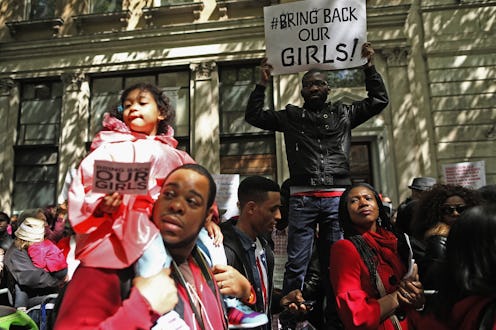News
Will The Chibok Girls Finally Be Released?
In a statement by Nigerian officials Friday, Nigeria announced a ceasefire deal with Boko Haram. According to the terms of the deal, the militant group will release over 200 kidnapped Chibok schoolgirls. The news was met with immediate skepticism by experts; Nigeria has misled the public a handful of times about the kidnapping in the past.
The announcement also comes at a politically sensitive time, as President Goodluck Jonathan is up for re-election, and good news about the kidnapped Chibok girls could well boost his chances at the ballot box. Boko Haram itself has yet to issue a statement.
Air Marshal Alex Badeh, Nigeria’s top military officer, said that a "ceasefire agreement" had been concluded between the government and the group, adding,
I have accordingly directed the service chiefs to ensure immediate compliance with this development.
Doubts about the credibility of the announcement stem from puzzlement over who Danladi Ahmadu is. Hassan Tukur, a senior aide to President Jonathan, claimed that Ahmadu represented Boko Haram during negotiations in Chad. However, Boko Haram expert and civil rights activist Shehu Sani, who has previously negotiated with the group on behalf of the government, told AFP that he had never heard of Ahmadu before, and that,
If Boko Haram wanted to declare a ceasefire it would come from the group's leader Abubakar Shekau.
According to BBC, Tukur said arrangements for the release of the Chibok girls would be finalized at a meeting next week in Chad's capital, Ndjamena.
Ahmadu claimed he was the insurgent group's "chief security officer" in an interview on Voice of America radio's Hausa language service, and that he was in charge of publicity. According to AFP, Ahmadu was vague on details of the "negotiations" and said that he had not met Shekau — which is suspicious, given that the Shekau has previously rejected negotiating on any terms.
He also referred to the group by the name coined by outsiders — Boko Haram — instead of Jama'atu Ahlis Sunna Lidda'awati wal-Jihad, the name the group's leaders have used exclusively. In English, it means "People Committed to the Propagation of the Prophet's Teachings and Jihad".
Will Ross, BBC's correspondent in Lagos, said the agreement was a surprising development, as Nigerian officials hadn't previously indicated that negotiations were even taking place. If all this sounds a little sketchy to you, Ross reported that Nigerians are also cautious about the announcement, and "will only celebrate once the girls are free."
Images: AFP; Getty Images
